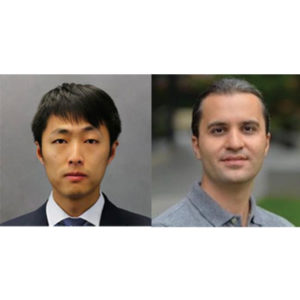
“Messaging in the Age of Microtargeting”
John Stafford
Assistant Vice President
Digital Strategy
Stanford University
Bjorn Carey
Senior Director
Digital Strategy
Stanford University
Join via Zoom: https://stanford.zoom.us/j/400566542
Abstract:
Communications has become increasingly data-driven, targeted, and personalized. This has changed how Stanford analyzes communications opportunities from a research perspective and how it engages with relevant audiences. In this presentation, John and Bjorn will share the data and communications strategy underlying three communications initiatives and the resulting execution. They will also provide practical advice for individual thought leadership and communications in this dynamic environment.
About:
John Stafford, MA ’06, is currently Assistant Vice President for Digital Strategy at Stanford, the most senior digital communications role in the university. John is responsible for all aspects of creating a world-class digital communications function: setting the group’s strategy, building analytics and insight programs, counseling on crisis communications, leading multi-channel messaging initiatives, and advising colleagues across the University. He received a Master’s Degree in Communication from Stanford, a B.A. in History from the University of San Francisco, and was a founding advisor to Stanford Medicine X.
Refreshments will be provided.

“Algorithm Development Lifecycle in Medical Imaging:
Current State and Considerations for the Future”
Luciano M. Prevedello, MD, MPH
Vice-Chair for Medical Informatics and Augmented Intelligence in Imaging
Division Chief, Medical Imaging Informatics
Director, 3D and Advanced Visualization Lab
Associate Professor, Division of Neuroradiology,
Department of Radiology
Ohio State University Wexner Medical Center
Join via Zoom: https://stanford.zoom.us/j/267814863
Abstract:
This presentation will describe some of the most important considerations involved in creating algorithms in medical imaging from inception to deployment as well as continued model improvement and/or monitoring. Examples of experience to date from the OSU laboratory for augmented intelligence in imaging will be provided. New paradigms in model creation and the role of image challenge competitions will also be covered. Current issues with model validation and generalizability will also be introduced as well as considerations for future work in this area.
Refreshments will be provided.

“A Deep Learning Framework for Efficient Registration of MRI and Histopathology Images of the Prostate”
Wei Shao, PhD
Postdoctoral Research Fellow
Department of Radiology
Stanford University
“Applications of Generative Adversarial Networks (GANs) in Medical Imaging”
Saeed Seyyedi, PhD
Paustenbach Research Fellow
Department of Radiology
Stanford University
Join via Zoom: https://stanford.zoom.us/j/593016899
Refreshments will be provided
ABSTRACT (Shao)
Magnetic resonance imaging (MRI) is an increasingly important tool for the diagnosis and treatment of prostate cancer. However, MRI interpretation suffers from high interobserver variability and often misses clinically significant cancers. Registration of histopathology images from patients who have undergone surgical resection of the prostate onto pre-operative MRI images allows direct mapping of cancer location onto MR images. This is essential for the discovery and validation of novel prostate cancer signatures on MRI. Traditional registration approaches can be computationally expensive and require a careful choice of registration hyperparameters. We present a deep learning-based pipeline to accelerate and simplify MRI-histopathology image registration in prostate cancer. Our pipeline consists of preprocessing, transform estimation by deep neural networks, and postprocessing. We refined the registration neural networks, originally trained with 19,642 natural images, by adding 17,821 medical images of the prostate to the training set. The pipeline was evaluated using 99 prostate cancer patients. The addition of the images to the training set significantly (p < 0.001) improved the Dice coefficient and reduced the Hausdorff distance. Our pipeline also achieved comparable accuracy to an existing state-of-the-art algorithm while reducing the computation time from 4.4 minutes to less than 2 seconds.
ABSTRACT (Seyyedi)
Generative adversarial networks (GANs) are advanced types of neural networks where two networks are trained simultaneously to perform two tasks of generation and discrimination. GANs have gained a lot of attention to tackle well known and challenging problems in computer vision applications including medical image analysis tasks such as medical image de-noising, detection and classification, segmentation and reconstruction.In this talk, we will introduce some of the recent advancements of GANs in medical imaging applications and will discuss the recent developments of GAN models to resolve real world imaging challenges.

Radiomics and Radio-Genomics: Opportunities for Precision Medicine
Zoom: https://stanford.zoom.us/j/99904033216?pwd=U2tTdUp0YWtneTNUb1E4V2x0OTFMQT09
Pallavi Tiwari, PhD
Assistant Professor of Biomedical Engineering
Associate Member, Case Comprehensive Cancer Center
Director of Brain Image Computing Laboratory
School of Medicine | Case Western Reserve University
Abstract:
In this talk, Dr. Tiwari will focus on her lab’s recent efforts in developing radiomic (extracting computerized sub-visual features from radiologic imaging), radiogenomic (identifying radiologic features associated with molecular phenotypes), and radiopathomic (radiologic features associated with pathologic phenotypes) techniques to capture insights into the underlying tumor biology as observed on non-invasive routine imaging. She will focus on clinical applications of this work for predicting disease outcome, recurrence, progression and response to therapy specifically in the context of brain tumors. She will also discuss current efforts in developing new radiomic features for post-treatment evaluation and predicting response to chemo-radiation treatment. Dr. Tiwari will conclude with a discussion on her lab’s findings in AI + experts, in the context of a clinically challenging problem of post-treatment response assessment on routine MRI scans.

Location & Timing
August 5, 2020
8:30am-4:30pm
Livestream: details to come
This event is free and open to all!
Registration and Event details
Overview
Advancements of machine learning and artificial intelligence into all areas of medicine are now a reality and they hold the potential to transform healthcare and open up a world of incredible promise for everyone. Sponsored by the Stanford Center for Artificial Intelligence in Medicine and Imaging, the 2020 AIMI Symposium is a virtual conference convening experts from Stanford and beyond to advance the field of AI in medicine and imaging. This conference will cover everything from a survey of the latest machine learning approaches, many use cases in depth, unique metrics to healthcare, important challenges and pitfalls, and best practices for designing building and evaluating machine learning in healthcare applications.
Our goal is to make the best science accessible to a broad audience of academic, clinical, and industry attendees. Through the AIMI Symposium we hope to address gaps and barriers in the field and catalyze more evidence-based solutions to improve health for all.

Dear WMIS trainees, colleagues and friends,
We welcome you to join our upcoming virtual WMIS – Stanford Diversity conference on September 9-11, 2020. We are coming together to reinforce our commitment to diversity and to provide a forum for our team members to engage in meaningful discussions. The conference will provide keynote lectures, scientific presentations and educational lectures from leaders and pioneers in the field, who will discuss important topics related to racial justice, women in STEM and Global Health. We are also offering breakout sessions whereby carefully selected individuals will facilitate a discussion about how to implement more supportive and inclusive practices into our daily professional and personal life. The breakout sessions are designed to enable active involvement of smaller groups where people feel safe to discuss current challenges in the STEM field and actionable solutions.
This conference is free of charge and will provide 9.5 CME credits. Abstracts of all conference presentations and a summary of discussion points and insights provided by all conference participants will be published in Molecular Imaging & Biology. The organizing committee will provide 10 trainee prizes in the form of free WMIS memberships to conference attendants for the 2021 WMIC in Miami.
Website: https://www.wmislive.org

Judy Gichoya, MD
Assistant Professor
Emory University School of Medicine
Measuring Learning Gains in Man-Machine Assemblage When Augmenting Radiology Work with Artificial Intelligence
Abstract
The work setting of the future presents an opportunity for human-technology partnerships, where a harmonious connection between human-technology produces unprecedented productivity gains. A conundrum at this human-technology frontier remains – will humans be augmented by technology or will technology be augmented by humans? We present our work on overcoming the conundrum of human and machine as separate entities and instead, treats them as an assemblage. As groundwork for the harmonious human-technology connection, this assemblage needs to learn to fit synergistically. This learning is called assemblage learning and it will be important for Artificial Intelligence (AI) applications in health care, where diagnostic and treatment decisions augmented by AI will have a direct and significant impact on patient care and outcomes. We describe how learning can be shared between assemblages, such that collective swarms of connected assemblages can be created. Our work is to demonstrate a symbiotic learning assemblage, such that envisioned productivity gains from AI can be achieved without loss of human jobs.
Specifically, we are evaluating the following research questions: Q1: How to develop assemblages, such that human-technology partnerships produce a “good fit” for visually based cognition-oriented tasks in radiology? Q2: What level of training should pre-exist in the individual human (radiologist) and independent machine learning model for human-technology partnerships to thrive? Q3: Which aspects and to what extent does an assemblage learning approach lead to reduced errors, improved accuracy, faster turn-around times, reduced fatigue, improved self-efficacy, and resilience?
Zoom: https://stanford.zoom.us/j/93580829522?pwd=ZVAxTCtEdkEzMWxjSEQwdlp0eThlUT09

Ge Wang, PhD
Clark & Crossan Endowed Chair Professor
Director of the Biomedical Imaging Center
Rensselaer Polytechnic Institute
Troy, New York
Abstract:
AI-based tomography is an important application and a new frontier of machine learning. AI, especially deep learning, has been widely used in computer vision and image analysis, which deal with existing images, improve them, and produce features. Since 2016, deep learning techniques are actively researched for tomography in the context of medicine. Tomographic reconstruction produces images of multi-dimensional structures from externally measured “encoded” data in the form of various transforms (integrals, harmonics, and so on). In this presentation, we provide a general background, highlight representative results, and discuss key issues that need to be addressed in this emerging field.
About:
AI-based X-ray Imaging System (AXIS) lab is led by Dr. Ge Wang, affiliated with the Department of Biomedical Engineering at Rensselaer Polytechnic Institute and the Center for Biotechnology and Interdisciplinary Studies in the Biomedical Imaging Center. AXIS lab focuses on innovation and translation of x-ray computed tomography, optical molecular tomography, multi-scale and multi-modality imaging, and AI/machine learning for image reconstruction and analysis, and has been continuously well funded by federal agencies and leading companies. AXIS group collaborates with Stanford, Harvard, Cornell, MSK, UTSW, Yale, GE, Hologic, and others, to develop theories, methods, software, systems, applications, and workflows.

Radiology Department-Wide Research Meeting
• Curt Langlotz, MD, PhD: Overview of the AIMI Center
• Brian Hargreaves, PhD: Research Details from Town Hall, Q&A, and COVID19 Updates
Location: Zoom – Details can be found here: https://radresearch.stanford.edu
Meetings will be the 3rd Friday of each month.
Hosted by: Brian Hargreaves, PhD
Sponsored by: the the Department of Radiology

Radiology Department-Wide Research Meeting
Location: Zoom – Details can be found here: https://radresearch.stanford.edu
Meetings will be the 3rd Friday of each month.
February 19 Speakers:
Bruce Daniel, MD – Center Overview: IMMERS
Jennifer McNab, PhD – Encoding and Decoding Diffusion MRI
Hosted by: Brian Hargreaves, PhD
Sponsored by: the the Department of Radiology